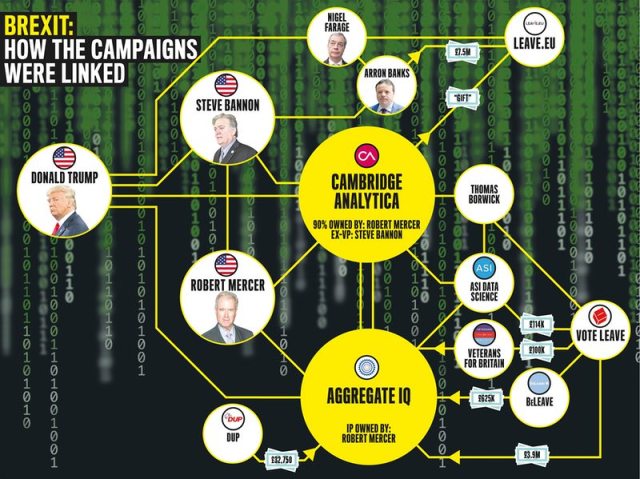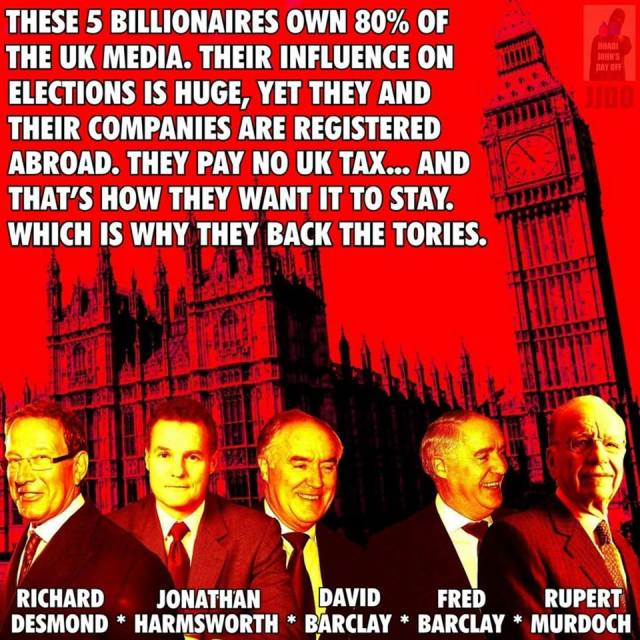Full Guardian Article:https://www.theguardian.com/technology/2017/may/07/the-great-british-brexit-robbery-hijacked-democracy
Key names mentioned in this article:
SCL Group
British company with 25 years experience in military “psychological operations” and “election management”.
Cambridge Analytica
Data analytics company formed in 2014. Robert Mercer owns 90%. SCL owns 10%. Carried out major digital targeting campaigns for Donald Trump campaign, Ted Cruz’s nomination campaign and multiple other US Republican campaigns – mostly funded by Mercer. Gave Nigel Farage’s Leave.EU “help” during referendum.
Robert Mercer
US billionaire hedge fund owner who was Trump’s biggest donor. Owns Cambridge Analytica and the IP [intellectual property] ofAggregateIQ. Friend of Farage. Close associate of Steve Bannon.
Steve Bannon
Trump’s chief strategist. Vice-president of Cambridge Analytica during referendum period. Friend of Farage.
Alexander Nix
Director of Cambridge Analytica and SCL Group.
Christopher Wylie
Canadian who first brought data expertise and microtargeting to Cambridge Analytica; recruited AggregateIQ.
AggregateIQ
Data analytics company based in Victoria, British Columbia, Canada. Worked for Mercer-funded Pacs that supported the Trump campaign. Robert Mercer owns AggregateIQ’s IP. Paid £3.9m by Vote Leave to “micro-target” voters on social media during referendum campaign. Outside British jurisdiction.
Veterans for Britain
Given £100,000 by Vote Leave. Spent it with AggregateIQ.
BeLeave
Youth Leave campaign set up by 23-year-old student. Given £625,000 by Vote Leave & £50,000 by another donor. Spent it with AggregateIQ.
DUP
Democratic Unionist Party of Northern Ireland. Spent £32,750 with AggregrateIQ.
Thomas Borwick
Vote Leave’s chief technology officer. Previously worked with SCL/Cambridge Analytica and AggregateIQ.
ASI Data Science
Data science specialists. Links with Cambridge Analytica, including staff moving between the two and holding joint events. Paid £114,000 by Vote Leave. Vote Leave declared £71,000 to Electoral Commission.
Donald Trump
US president. Campaign funded by Mercer and run by Bannon. Data services supplied by Cambridge Analytica and AggregrateIQ.
Nigel Farage
Former Ukip leader. Leader of Leave.EU. Friend of Trump, Mercer and Bannon.
Arron Banks
Bristol businessman. Co-founder of Leave.EU. Owns data company and insurance firm. Single biggest donor to Leave – £7.5m.

Illustration: James Melaugh
This Guardian article, published in May 2017, explains the research of Carole Cadwalladr into the links between Brexit and the Trump election, explaining that it came about through what is referred to as psychological operations, using voters data to persuade their vote. With campaigns spending money on the UK based Cambridge Analytica and the Canadian AggregateIQ, these companies then manipulated the collected data to influence voters caught in that 1% that could sway the election, 600,000 people who could be influenced in their decision.
Since I first ready the article in May I have returned to it many times, recently I have seen it captioned with “This article is the subject of separate legal complaints on behalf of Cambridge Analytica LLC and SCL Elections Limited, and Sophie Schmidt.”
Cambridge Analytica is called in the article: a central point in the right’s “propaganda machine”. Cadwalladr discovered that this company was aiming to manipulate the mainstream media by effectively destroying it to replace it with fake news, history and propaganda.
It began as a form of Psychological Warfare, manipulating elections in developing countries before moving into manipulating the elections of the West as well:
“Totally. That’s what it is. Psyops. Psychological operations – the same methods the military use to effect mass sentiment change. It’s what they mean by winning ‘hearts and minds’. We were just doing it to win elections in the kind of developing countries that don’t have many rules.”
This company has been found to be linked to AggregateIQ, the company that Vote Leave chose to spend £3.9m, more than half of its £7m campaign budget. According to Cadwalladr, Be Leave, Veterans for Britain and the Democratic Unionist parts spent £757,750 there as well.
“I went through all the Leave campaign invoices when the Electoral Commission uploaded them to its site in February. And I kept on discovering all these huge amounts going to a company that not only had I never heard of, but that there was practically nothing at all about on the internet. More money was spent with AggregateIQ than with any other company in any other campaign in the entire referendum. All I found, at that time, was a one-page website and that was it. It was an absolute mystery.”
“It’s almost like post-traumatic shock. It was so… messed up. It happened so fast. I just woke up one morning and found we’d turned into the Republican fascist party. I still can’t get my head around it.”
How Facebook is involved:
(Taken word-for-word from the article)
Earlier, psychologists at Cambridge University harvested Facebook data (legally) for research purposes and published pioneering peer-reviewed work about determining personality traits, political partisanship, sexuality and much more from people’s Facebook “likes”. And SCL/Cambridge Analytica contracted a scientist at the university, Dr Aleksandr Kogan, to harvest new Facebook data. And he did so by paying people to take a personality quiz which also allowed not just their own Facebook profiles to be harvested, but also those of their friends – a process then allowed by the social network.
Facebook was the source of the psychological insights that enabled Cambridge Analytica to target individuals. It was also the mechanism that enabled them to be delivered on a large scale.
The company also (perfectly legally) bought consumer datasets – on everything from magazine subscriptions to airline travel – and uniquely it appended these with the psych data to voter files. It matched all this information to people’s addresses, their phone numbers and often their email addresses. “The goal is to capture every single aspect of every voter’s information environment,” said David. “And the personality data enabled Cambridge Analytica to craft individual messages.”
Finding “persuadable” voters is key for any campaign and with its treasure trove of data, Cambridge Analytica could target people high in neuroticism, for example, with images of immigrants “swamping” the country. The key is finding emotional triggers for each individual voter.
“The capacity for this science to be used to manipulate emotions is very well established. This is military-funded technology that has been harnessed by a global plutocracy and is being used to sway elections in ways that people can’t even see, don’t even realise is happening to them,”
“It’s about exploiting existing phenomenon like nationalism and then using it to manipulate people at the margins. To have so much data in the hands of a bunch of international plutocrats to do with it what they will is absolutely chilling. We are in an information war and billionaires are buying up these companies, which are then employed to go to work in the heart of government. That’s a very worrying situation.”
Tamsin Shaw, associate professor of philosophy at New York University
Not only is using data in this way terrifying, but it is also supporting only the campaigns with the money. There has always been an unfair advantage looking, for example, at the differences between campaigning budget between Conservatives and Labour, where the Conservative Party spend almost double what Labour can afford. There is an obvious risk in swaying the vote by having this much more money to persuade and campaign, but if that money is being pumped into right-wing propaganda psychological operations, there is a need to question the effectiveness and structure of our electoral process.

